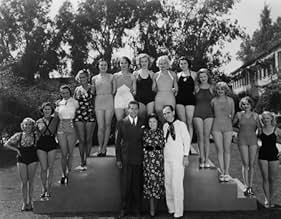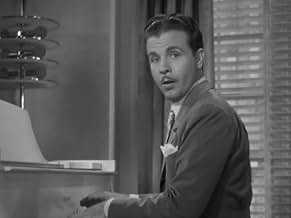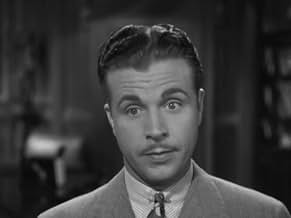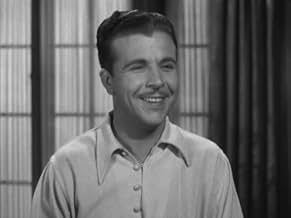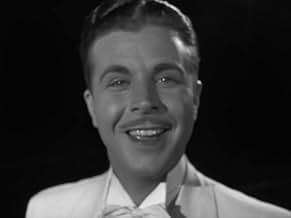ÉVALUATION IMDb
6,4/10
1,3 k
MA NOTE
Ajouter une intrigue dans votre langueWhen two investors inform an opportunistic dancer that they can't fund an elderly stage producer's production, she suggests they get an insurance policy on the producer's life.When two investors inform an opportunistic dancer that they can't fund an elderly stage producer's production, she suggests they get an insurance policy on the producer's life.When two investors inform an opportunistic dancer that they can't fund an elderly stage producer's production, she suggests they get an insurance policy on the producer's life.
- Nommé pour 1 oscar
- 2 victoires et 1 nomination au total
Charles D. Brown
- Hugo
- (as Chas. D. Brown)
William B. Davidson
- Andy Callahan
- (as Wm. Davidson)
Bobbie Adams
- Chorus Girl
- (uncredited)
Iris Adrian
- Verna
- (uncredited)
Avis en vedette
Gold Diggers of 1933 was a terrific film with some of Busby Berkeley's best material. Gold Diggers of 1935 was almost as good too, but this was a little disappointing. Apart from the cracking final number All's Fair in Love and War Berkeley's choreography lacks excitement and has a rather toned down feeling to it(censorship no doubt had something to do with it). While it still looks quite nice, it's nicely shot and the costumes are well-tailored, there is also a sense with the less-than-grand sets and how some scenes are staged that there was a lack of budget. Dick Powell sings beautifully and has a charming appearance but can have a tendency to be a little too sappy and wooden here. The songs are very nice and catchy still, Speaking of the Weather is charming and All's Fair in Love and War is catchy and in all respects the highlight of the film. There's plenty of snappy dialogue to savour also, and while with some silly moments the plot is actually pretty decent and paced well. The performances compliment the film nicely, Victor Moore is very funny and wonderfully cranky, Joan Blondell still charms even when in more subdued mode and Glenda Farrell is deliciously sassy, coming this close to stealing the film whenever she appears. All in all, disappointing but still enjoyable. 7/10 Bethany Cox
The next to last of the Gold Digger films finds Dick Powell as a rather unenthusiastic insurance salesman who'd rather be in show business, roped into selling an insurance policy to hypochondriac Broadway producer Victor Moore.
Moore's got bigger problems than imaginary illnesses. He's got a couple of crooked partners in Charles D. Brown and Osgood Perkins. They've taken money from Moore and put in some stock that went belly up. Now to get the money back they have a scheme to insure Moore and then maybe push him along into eternity. In fact they almost trip him into it during the film.
Joan Blondell is a former chorus girl now turned stenographer at the insurance company office and she gets her friends together with Powell and Lee Dixon from the company and they help Moore out.
Gold Diggers of 1937 doesn't have quite the madcap lunacy of the 1935 edition, but still there's a lot of entertainment there. Busby Berkeley gets only two numbers here to demonstrate is creativity, Let's Put Our Heads Together and the finale All's Fair in Love and War. Powell solos with With Plenty of Money and You and he duets with current wife Blondell in Speaking of the Weather.
Lee Dixon was a very talented dancer who graced a few musical films and then went east to Broadway and made his biggest splash as Will Parker in the original production of Oklahoma. Dixon died tragically young in 1953. I think he should have gotten some recognition from the Academy for having the nerve to go into this film playing a character named Boop Oglethorpe.
There was only one more round for the Gold Diggers as in their next film they went to Paris and it was ended after that. This version is entertaining enough, even if not up to 1933 or 1935.
Moore's got bigger problems than imaginary illnesses. He's got a couple of crooked partners in Charles D. Brown and Osgood Perkins. They've taken money from Moore and put in some stock that went belly up. Now to get the money back they have a scheme to insure Moore and then maybe push him along into eternity. In fact they almost trip him into it during the film.
Joan Blondell is a former chorus girl now turned stenographer at the insurance company office and she gets her friends together with Powell and Lee Dixon from the company and they help Moore out.
Gold Diggers of 1937 doesn't have quite the madcap lunacy of the 1935 edition, but still there's a lot of entertainment there. Busby Berkeley gets only two numbers here to demonstrate is creativity, Let's Put Our Heads Together and the finale All's Fair in Love and War. Powell solos with With Plenty of Money and You and he duets with current wife Blondell in Speaking of the Weather.
Lee Dixon was a very talented dancer who graced a few musical films and then went east to Broadway and made his biggest splash as Will Parker in the original production of Oklahoma. Dixon died tragically young in 1953. I think he should have gotten some recognition from the Academy for having the nerve to go into this film playing a character named Boop Oglethorpe.
There was only one more round for the Gold Diggers as in their next film they went to Paris and it was ended after that. This version is entertaining enough, even if not up to 1933 or 1935.
A nostalgic look at the old-fashioned (and very corny) musicals of the '30s produced by WB is the only reason for viewing this oldie with Dick Powell and Joan Blondell. Not even the veteran scene-stealer Victor Moore is able to salvage the silly plot nor the shenanigans of the scheming Glenda Farrell.
The weak excuse for a story is all about being able to put on a Broadway show--namely, getting the money to fund it. When the show finally does get staged, it's done in Busby Berkeley style with camera effects that couldn't possibly be duplicated in a real stage show--including trick special effects. But of course, all logic disappeared when watching musicals such as this in the '30s and depression weary audiences probably couldn't have cared less.
One of the crafty villains Morty Wethered (Osgood Perkins) is played by Anthony Perkins' father. And if you look real fast, you can spot Jane Wyman who has one line to speak as a chorus girl.
The tunes are nothing to shout about but "Speaking of the Weather" is done in charming style with Powell and Blondell in a rainy day office scene and later reprised during the poolside sequence. "All's Fair In Love and War" is the big finale--but ultimately the viewer is left with the feeling that this has all been done before and with better results in previous "Gold Digger" films. Most earnest emoting in the film is done by Dick Powell who breezed through his Warner musicals with confidence and charm.
The weak excuse for a story is all about being able to put on a Broadway show--namely, getting the money to fund it. When the show finally does get staged, it's done in Busby Berkeley style with camera effects that couldn't possibly be duplicated in a real stage show--including trick special effects. But of course, all logic disappeared when watching musicals such as this in the '30s and depression weary audiences probably couldn't have cared less.
One of the crafty villains Morty Wethered (Osgood Perkins) is played by Anthony Perkins' father. And if you look real fast, you can spot Jane Wyman who has one line to speak as a chorus girl.
The tunes are nothing to shout about but "Speaking of the Weather" is done in charming style with Powell and Blondell in a rainy day office scene and later reprised during the poolside sequence. "All's Fair In Love and War" is the big finale--but ultimately the viewer is left with the feeling that this has all been done before and with better results in previous "Gold Digger" films. Most earnest emoting in the film is done by Dick Powell who breezed through his Warner musicals with confidence and charm.
The snappy dialogue and pace of Berkeley's previous films are not to be found here--GD of '37 feels more like a Republic musical than a Warners one. The bankroll went to the one big Berkeley number at the end--"All Is Fair In Love and War." It's a simple piece, lines of chorus girls dressed in white against a shiny black floor, but it is simply astonishing (the song is pretty catchy too). There is also a nice little number with Powell and Blondell called "Speaking of The Weather"--an interesting attempt to seamlessly integrate a musical number into the plot. Among the mistakes (besides the script) is the short-shrift given to the best, most popular song in the film--"With Plenty of Money and You."
Dick Powell is an insurance salesman who sells a million dollar policy to a producer in "Gold Diggers of 1937" also starring Joan Blondell, Victor Moore, Osgood Perkins and Glenda Farrell.
Due to bad investments by his staff, producer/hypochondriac Hobart (Moore) has no idea that the show he's planning to put on can't be financed. The men responsible for losing his money get Rosmer (Powell), an insurance salesman, to sell Hobart a $1 million policy, figuring he won't live and then the show can be done.
The funniest part of the movie is when Rosmer tells his fellow insurance salesmen of his coup and then announces that Hobart is 59. "59!" one of them exclaims. "He'll never pass the physical." "We sold a policy to a 68-year-old last year," someone says, "and he passed." "Yeah," the reply is, "passed OUT."
Interesting that 59 was thought of as more than 79 in the '30s. Coincidentally, Dick Powell himself died at the age of 59.
It's Rosmer's job to keep Hobart alive and it's his partners' job to help him to the pearly gates. They send in Glenda Farrell to break his heart, figuring he'll want to end it all, but things don't work out as they planned.
They throw him in a pool at a party; he doesn't catch cold, nor does he drown. It's actually pretty funny.
There are some pleasant songs which Powell sings beautifully, and a big Busby Berkeley number at the end, but I imagine as this is part of a series of "Gold Digger" films, audiences wanted something more.
The performances are good - chameleon Powell is a great, earnest salesman, Joan Blondell (who was either Powell's wife or about to become his wife) is adorable as a showgirl, and Moore is hilarious. Glenda Farrell is a real scene-stealer with her great line delivery.
Pleasant but not much as far as musical values.
Due to bad investments by his staff, producer/hypochondriac Hobart (Moore) has no idea that the show he's planning to put on can't be financed. The men responsible for losing his money get Rosmer (Powell), an insurance salesman, to sell Hobart a $1 million policy, figuring he won't live and then the show can be done.
The funniest part of the movie is when Rosmer tells his fellow insurance salesmen of his coup and then announces that Hobart is 59. "59!" one of them exclaims. "He'll never pass the physical." "We sold a policy to a 68-year-old last year," someone says, "and he passed." "Yeah," the reply is, "passed OUT."
Interesting that 59 was thought of as more than 79 in the '30s. Coincidentally, Dick Powell himself died at the age of 59.
It's Rosmer's job to keep Hobart alive and it's his partners' job to help him to the pearly gates. They send in Glenda Farrell to break his heart, figuring he'll want to end it all, but things don't work out as they planned.
They throw him in a pool at a party; he doesn't catch cold, nor does he drown. It's actually pretty funny.
There are some pleasant songs which Powell sings beautifully, and a big Busby Berkeley number at the end, but I imagine as this is part of a series of "Gold Digger" films, audiences wanted something more.
The performances are good - chameleon Powell is a great, earnest salesman, Joan Blondell (who was either Powell's wife or about to become his wife) is adorable as a showgirl, and Moore is hilarious. Glenda Farrell is a real scene-stealer with her great line delivery.
Pleasant but not much as far as musical values.
Le saviez-vous
- AnecdotesMultiple references to 'carloadings' being up, meaning an increase in the total amount of goods shipped by railroad. Back before stores and other businesses reported total monthly sales, carloadings was the best available measure of consumer spending.
- Gaffes(at around 20 min) A string used to make a stack of books fall onto Dick Powell's head is clearly visible against the white paper background.
- Citations
Rosmer Peak: Would you call Andy if I kiss you?
Norma Perry: Not unless you want to kiss him too.
- Générique farfeluThe usual disclaimer goes to great lengths to assure us that "The names of all characters -- The characters themselves -- The story - all incidents and institutions portrayed in this production are fictitious -- And no identification with actual persons, living or deceased, is intended or should be inferred."
- Autres versionsThere is an Italian edition of this film on DVD, distributed by DNA srl, "VIVA LE DONNE! (1933) + AMORE IN OTTO LEZIONI (1936)" (2 Films on a single DVD), re-edited with the contribution of film historian Riccardo Cusin. This version is also available for streaming on some platforms.
- ConnexionsEdited into Busby Berkeley and the Gold Diggers (1969)
- Bandes originalesWith Plenty of Money and You
(1936)
Music by Harry Warren
Lyrics by Al Dubin
Sung by Dick Powell (uncredited)
Meilleurs choix
Connectez-vous pour évaluer et surveiller les recommandations personnalisées
- How long is Gold Diggers of 1937?Propulsé par Alexa
Détails
- Date de sortie
- Pays d’origine
- Langue
- Aussi connu sous le nom de
- Gold Diggers of 1937
- Lieux de tournage
- société de production
- Consultez plus de crédits d'entreprise sur IMDbPro
- Durée1 heure 41 minutes
- Couleur
- Mixage
- Rapport de forme
- 1.37 : 1
Contribuer à cette page
Suggérer une modification ou ajouter du contenu manquant



